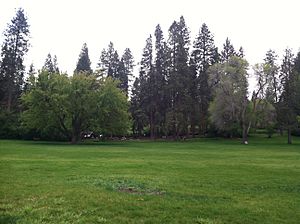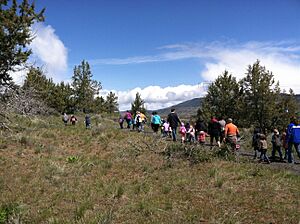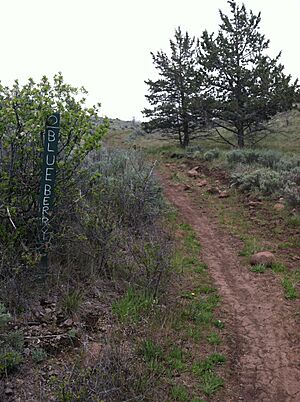Moore Park (Oregon) facts for kids
Quick facts for kids Moore Park |
|
|---|---|

One of the soccer fields and picnic areas within Moore Park, Klamath Falls, Oregon
|
|
| Location | Klamath Falls, Oregon, United States |
| Area | 458 acres (185 ha; 0.716 sq mi) |
| Open | Dawn to dusk, daily, year round |
Moore Park is a really cool park in Klamath Falls, Oregon, in the United States. It's right next to the southern part of Upper Klamath Lake. Many people visit Moore Park to enjoy nature and outdoor activities.
The park is a great place to go fishing, especially if you have a boat. Most fishing on Klamath Lake needs a boat. Moore Park has paved boat ramps, which are popular spots to get your boat into the water.
Where is Moore Park?
Moore Park is located near Putnam's Point. This is at the northern end of the Link River Trail. The park is about 15 miles (24 km) from downtown Klamath Falls.
You can get to Moore Park using U.S. Route 97 and U.S. Route 140. The park also has boat access to Upper Klamath Lake. The Howard Bay ramp, on the west side of the lake, is a very popular spot for boats.
Fun Things to Do
Moore Park has many fun things for you to do! You can launch your boat, canoe, or kayak from the boat launch. This is on the west side of the park, across Lakeshore Drive. There are paved ramps, restrooms, and docks for boats.
The park also has big soccer fields and tennis courts. There are open areas where you can play games. You'll find large picnic areas with barbecue pits, perfect for a family day out. There are also day camp areas.
If you love being outdoors, Moore Park has a huge system of trails. You can go hiking or mountain biking on these trails. There's even a special place called the Gingerbread House. The road that used to let cars in from the north is now a trail for walking and biking.
Amazing Animals You Might See
The Klamath Basin, where Moore Park is located, is a very important place for birds. Many birds stop here during their long migrations across the United States.
In the higher parts of Moore Park, you can see many types of forest birds. You might even spot bald eagles flying overhead! Near the hills and the lake shore, including Putnam Point, you can often see different water birds. These include black-crowned night herons, Clark's and western grebes. You might also see snowy egrets, green herons, Barrow's goldeneyes, hooded merganser, and tree swallows.
During the spring, many colorful warblers visit the park. Keep an eye out for yellow-rumped, yellow, Wilson's, and orange-crowned warblers.
In the summer, you might see small animals like Ground squirrels and yellow-bellied marmots. They often hang out near the rocky areas of Moore Park.
Plants and Trees
Moore Park covers 458 acres (185 ha). It has different types of plant life. Close to the lake, you'll find grassy parkland. As you go higher from the roads, the plants change.
You can find areas with juniper trees and sagebrush. There are also dense pine forests. Most of the forests in Moore Park are made up of western juniper trees. These trees are very tough. They can live even when it's very dry. This helps them grow better than other plants.
For a long time, fires were stopped in the Klamath Basin. This allowed western juniper trees to spread quickly into other plant areas. To help other plants grow in Moore Park, park managers sometimes thin out the juniper woodlands.
In the sagebrush areas, you'll also see sagebrush, Klamath plum, and bitterbrush.
 | James Van Der Zee |
 | Alma Thomas |
 | Ellis Wilson |
 | Margaret Taylor-Burroughs |



